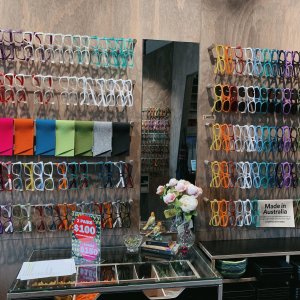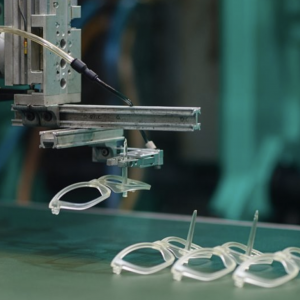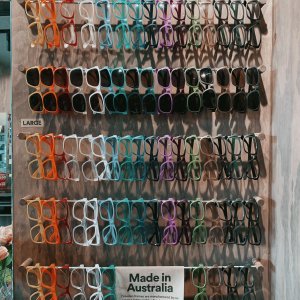Founder of Dresden Optics, Bruce Jeffreys, had a vision to create a new experience for people who wear glasses. Jeffreys wanted to fashion a sustainably made product that could be brought to anyone in the world, no matter where they lived or how much money they had. Jeffreys worked with co-founder Jason McDermott to design a sustainable and innovative solution that does not compromise the earth.
“Going back in history, eyewear came from jewellery, and people are still treating frames as expensive jewels,” Jeffreys said, “but we think they should be tough, recyclable and strong enough to play sport in without breaking.”
Dresden has sold more than 90,000 frames in the last four years globally. The company uses one universal shape for its frames, which was inspired by the German values of design and manufacturing, making them highly recognisable. The frame design features 16 colours that have interchangeable arms for personalisation. The modular design means you can customise the colours down to the locking pins that hold together the frames and the arms. They also have limited edition transition colours, which are highly sought after by Dresden wearers.
“We manufacture our frames ourselves, so when we finish a colour run, we can push through other colours to create unique one-off colours,” said West End store manager Jan Bathersby. 2.5 billion people live with poor vision unnecessarily because they do not have access to affordable glasses, according to Dresden statistics. Dresden’s glasses system and its replaceable, interchangeable parts provide a durable alternative to the disposable fashion industry. The modular design enables easy repair at a low cost, and lots of options for customisation. The team says that normally there are 220 to 240 steps in the manufacturing steps for glasses, but at Dresden, they have managed to cut that down to eight. The glasses are made with virgin nylon for strength, and a recyclable byproduct.
“We have, in the past, recycled decommissioned Australian bank notes, beer keg lids by Young Henrys, and fishing nets from the Arnhem lands,” said Bathersby.
Each frame that is made new with the virgin nylon goes back into Dresden’s closed loop system at the end of its lifecycle as well. This means the production process creates zero waste. Dresden prides itself on being the only sustainable glasses company that creates durable and affordable glasses that produce zero waste.
“If you ever break your frame, you can bring them back in, and we feed it back into our closed loop injection moulding so that they can become a part of another pair of glasses,” said Bathersby. Dresden is also introducing a new range of glasses made from post consumer waste products for the first time, which is to be revealed within the next few months. Dresden’s West End store is vibrant, warm, and welcoming. It is a store that’s environmental strategies fit in well with the West End culture. The store frequently gives back to the community through local events and organisations, for example, by collecting pre-loved frames, inserting reading power, and re-distributing them to local foodbanks. Dresden West End also contributes to the Kurilpa Derby and frequently sponsors community events.
Read more about Dresden Optics in our story Sustainable Sunnies













